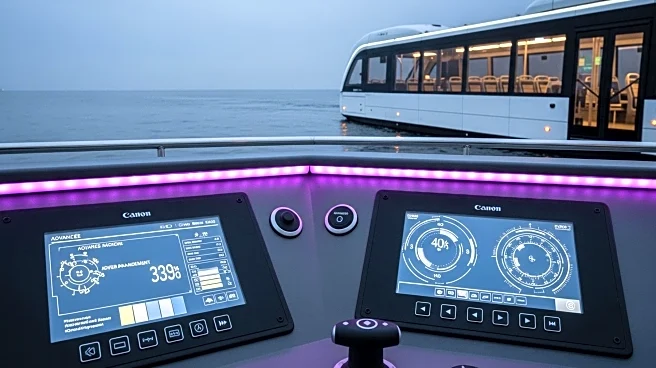What's Happening?
ComAp has partnered with Damen, a leading shipbuilder, to deliver a comprehensive power management system (PMS) for the Damen Waterbus 2907 Hybrid. This collaboration aims to advance the electrification of Damen's city ferry fleet, which includes operations between Rotterdam and Drechtsteden. The project focuses on integrating a hybrid power system that manages both AC and DC buses, ensuring seamless cooperation and external control of the power infrastructure. ComAp provided a fully integrated solution with customized software tailored to Damen's specifications, including a suite of controllers, communication modules, and displays. The system was commissioned by ComAp engineers, ensuring smooth operation from the outset.
Why It's Important?
The implementation of this advanced power management system is significant for the maritime industry as it represents a step forward in reducing emissions and improving efficiency. By integrating hybrid power systems, Damen can offer more sustainable and efficient marine operations, aligning with the industry's broader goals of future-proofing operations and cutting emissions. This project highlights the potential for electrification across various vessel types, including ferries, workboats, and tugboats, as operators seek reliable solutions to enhance performance and sustainability. ComAp's expertise in hybrid power control supports this transition, providing a scalable and flexible platform for maritime stakeholders.
What's Next?
As the maritime industry continues to prioritize sustainability, the success of the Damen Waterbus 2907 Hybrid could encourage further adoption of hybrid power systems across different vessel types. Stakeholders may look to replicate this model to achieve similar efficiency and emission reduction goals. The collaboration between ComAp and Damen sets a precedent for future projects, potentially influencing other shipbuilders to explore advanced power management solutions. Continued innovation in this area could lead to broader industry shifts towards cleaner marine operations.
Beyond the Headlines
The project underscores the importance of collaboration between technology providers and shipbuilders in achieving sustainability goals. It also highlights the growing demand for customized solutions that meet specific operational requirements. As the maritime industry evolves, the ability to adapt and integrate new technologies will be crucial in maintaining competitiveness and meeting regulatory standards. This development may also prompt discussions on the regulatory framework needed to support widespread adoption of hybrid systems in maritime operations.









